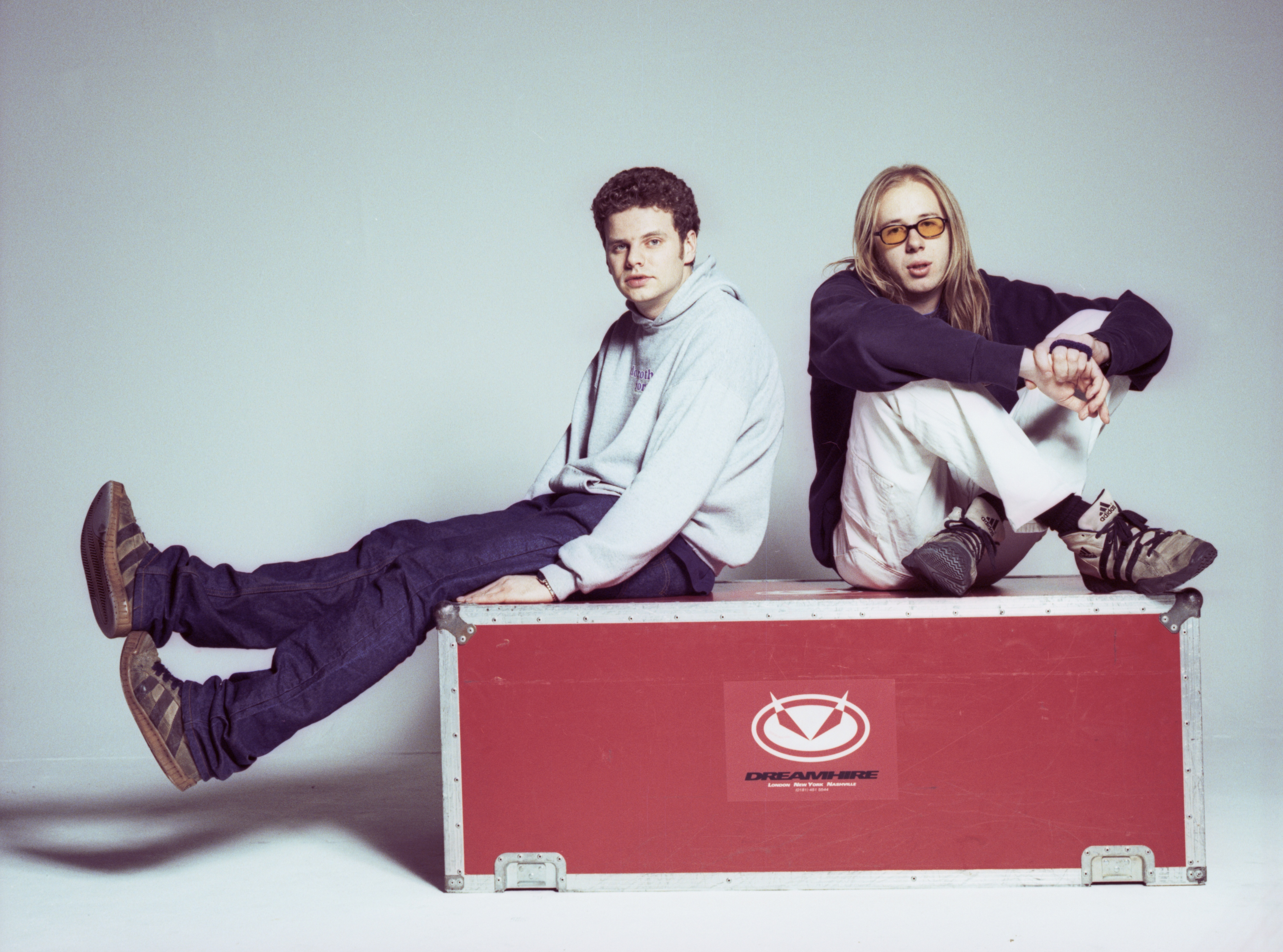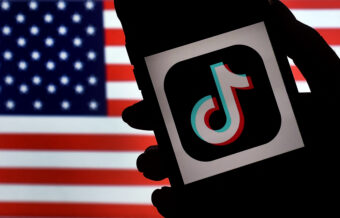This story originally appeared in the June 1997 issue of Spin. To celebrate the Chemical Brothers’ new album No Geography, we’re republishing it here. Revisit our original review of their landmark 1997 album Dig Your Own Hole here.
You say you want a revolution? We-ell, you know…The Chemical Brothers are sitting at home in London, skimming through a stack of recent U.S. press clippings, all of which bear Polyannish headlines like Electronic Eden and Smells Like Techno Spirit, and all of which focus less on the duo than on electronicamania. “Electronic music is poised for power surge in the States,” reads Tom Rowlands, in one of the numerous sarcastic drawls he reserves for suspect statements. Ed Simmons lingers over a piece in New York’s Daily News that enthuses about the Prodigy but confuses their musical visionary, Liam Howlett, with their haircut visionary, Keith Flint. Rowlands and Simons also just received a list of IDs they’re supposed to record for a powerful modern-rock radio station. “Hi, this is Ed and Tom, and we are the Chemical Brothers, back on KROQ with another one of those block rockin’ beats” seems acceptable, but what about “Wake up Muppets! It’s the Chemical Brothers here on KROQ!”? The American radio rep attached a note: “If you feel weird about the Mupped thing, don’t do it, but I think it’s great because they’ll have no idea you’re letting ’em have it!”
“And I guess that’s the question: Who’s zooming who here? When the Chemical Brothers’ first album, Exit Planet Dust, managed to sell more than 100,000 copies in the U.S. with little promotional help, a music industry that understands corporate math (Fugazi sales of 100,000 equal potential Rage Against the Machine sales in the millions) kicked into overdrive. “I’m looking for something like the Chemical Brothers right now” remarried a typical A&R lemming in the music industry tip sheet Hits. MTV announced a format shift away from alternative rock and toward electronica, citing the Chemical Brothers’ video “Setting Sun” as an inspiration. The Chemicals’ new album, Dig Your Own Hole, has been greeted with the kind of attention usually reserved for bands 50 times their size. When I first meet Simmons, 27, and Rowlands, 26, they’re in New York for press ops that include Time, Newsweek, Alternative Nation, and newsstands’ worth of music mags. When I rejoin them in London, they’re just back from four days of Q& A in France. Now they’re preparing a world tour that will cover England, America, Japan, and Singapore, stop in Hawaii for glorious vacation, then return to Europe for the summer festival circuit before heading back to the U.S. for a still-tentative autumn excursion with the Prodigy.
With all the shrillness and expectations, a certain basic issue has been largely ignored: Their sonic aptitude for funky breakbeats aside, the Chem Bros. are not particularly rock’n’rollers, let alone rock stars. This has nothing to do with anti-rock dance-music credos, and everything to do with the personal temperaments of two pleasant fellows from the right side of the tracks. “We’ve read things like, we’ve got a charisma bypass,” Rowlands complained to the NME. “Well, we didn’t ask to be in this position…We are what we are: nice middle-class kids. Quiet and reasonable people.” In New York, he tells me: “It would just be pure baloney to sit here inventing rock’n’roll things we do. Neither of us is going to turn into Dave Gahan.” When I tell the two they’ve been called the Beavis and Butt-head of techno in more than one publication, Simons doesn’t even presume there’s a musical criticism involved. “Maybe it’s ’cause we’re a bit socially inadequate. We used to go out all the time and just sit in the bar, wearing normal clothes.”
Rowlands: “People thought we were drug dealers.”
None of which is to suggest that the Chemical Brothers are perpetuating a musical scam. Exit Planet Dust wowed the smooth power and range, not punk rawness: Simons and Rowlands’s electronic loops pushed against the conventions of clubland in ways that sounded large and full to rock fans. As DJ and Quango Records auteur Jason Bentley once put it: “They take a whole new song structure, the song structure of a house record, and make a psychedelic rock record.” Dig Your Own Hole is even more rockishly ambitious: “Setting Sun” is a fully realized collaboration with Oasis‘s Noel Gallagher; “The Private Psychedelic Reel,” a jam augmented by Buffalo avant-boogie band Mercury Rev; “Where Do I Begin,” a folkish confessional (with lyrics written by Rowlands) sung by Beth Orton. And the more clubby cuts that anchor the Checmicals’ albums are louder-sounding here (if less instantly charming), densely pocked with samples that never stop twisting into new soundscapes. All but unique in electronica, nearly every track on Dig Your Own Hole achieves a separate identity; the album has an order and a flow. As Rowlands intones, “It’s smaaart.”
We’ve convened in Simons’s West London flat, a basement one-bedroom in a city-block-long apartment complex. There’s a dungeon feel: lantern lights on the walls, dark paneling. Vinyl fills a solid corner (including one record set apart, by Trinidad Bill, called Hardness is Badness); the bookshelf contains two copies of Trainspotting; gold and silver record awards for “Setting Sun” and Exit Planet Dust have yet to be hung; testimonies to an Immense Beatles fixation include the documentary video collection, a nice framed photo of the swinging ’60s McCartney, and a book on Apple Records. (Simons and Rowlands named “The Private Psychedelic Reel” after a Japanese bootleg of unreleased Beatles psychedelia, “tracks that they recorded specifically for themselves to take acid to.”) By the telephone—no small honor, as Simons is an incessant phone chatter—sits a photo of his live-in girlfriend, a “techno purist,” in Simons’s words, who rides him when he indulges his classic-rock tendencies. She is in Los Angeles at the moment, helping David Lynch promote his new film Lost Highway, a fact that doesn’t seem to trouble Simons too much. “We don’t have that stable of a relationship,” he says a little archly. “It’s more stable when she’s away. You miss what’s not there.”
Simons later drives me around in a sporty green Volkswagen, his only conspicuous sign of material success. He’s less sarcastic than Rowlands, almost definitely nerdier, and he’s a little at a loss without his partner, like a fan-boy collector who somehow crossed over to the other side. Simons grew up in a South London suburb, his single-parent mom a family-law specialist. A teen club goer, he fell hard for acid house, especially once at college in Manchester, home of Factory Records’ legendary Hacienda club. “The whole thing about acid house was equity. It wasn’t how you were dressed; it was first in the queue, first in. It wasn’t an exclusive thing at the start. Acid house, and Ecstasy, was about the removal of any type of cliques from the club. At the time we were going there were maybe a thousand people there, and that was a thousand people on Ecstasy. You don’t see that happening anymore—it was just a complete frenzy of flailing limbs and sweaty faces. I felt totally comfortable. Just people tracing out, wearing big tent T-shirts, sexless.”
After kindly buying me a beer and lunch, then awkwardly spitting in my soup when he gets carried away making a point about “Private Psychedelic Reel”—”the celebration vibe: There’s a lot of positivity in it, making music that really does make people feel good, and has heart-living qualities”—Simons drops me off in Notting Hill Gate, on the relaxed block where Rowland lives with his girlfriend of five years, Vanessa Rand. She runs the electronic label Concrete (Death in Vegas are probably its best-known act) and she lent the Chemical Brothers what small hint of style they possess when she bought Tom his trademark yellow specs two years back. Vanessa and Tom are in the process of buying a bigger place a block away, but unlike Simons’s, this is clearly a home for two—Rowlands even stores his vinyl elsewhere, in his studio and at his folks’ estate.
I’m guessing about the estate part, but only a little. There’s a song on the new album called “Piku,” named after the rowboat Tom and Ed used to ferry supplies when they stay at Tom’s parents’ summer place, off a lagoon in France. Rowlands’s dad is a director of photography, who now films adverts but who in the ’60s manned the camera for documentaries about the Six Day War and the Animals on tour in Czechoslovakia—”he has these funny pictures of himself with Eric Burdon and these peasants.” Tom grew up comfortably in Henley-on-Thames, a rural spot but less than an hour from London, his parents fronting him the money to buy a guitar at 12, a drum machine two years later, and a sampler at 17, when he formed a band called Ariel with school friends. Rummaging through Vanessa’s vinyl stash—it must be noted, with a tear for his diminishing red, that despite the presence of two turntables in the apartment, neither was plugged in so the outlet could be devoted to computer games like Die Hard—he plays me “Sea of Beats,” Ariel’s first recording from 1990. Shockingly, it’s good—with a bass line sampled off a record called “Mystic Moods, Cosmic Sea” that’s crunchingly pumped up and just a little weird, absolutely in the Chem Bros. vein.
Rowlands is the only Chemical Brother with a key to their studio, the one who works the computer when they’re recording and plays guitars—sampled and distorted (“that’s where I’m happiest for my guitar to be: inside a machine”)—on their tracks. He’s got the confidence of a kid with wealth, a kid who already had records out while his friends were muddling through college. He and Simons met up their first week at Manchester University, 1989. “Ed had a very nonmusical background, in the strict sense, but he had been to a lot of the clubs and raves that I had been to. We knew the same records” —titles like “The Phantom,” by Renegade Soundwave, if you’re wondering. The two would room together, take classes in medieval history together, and go clubbing four nights a week. As Ariel splintered, they started Doing together, on a Manchester night called Naked Underwater Leather, before recording their first track, “Song to the Siren,” on Rowlands’s bedroom Hitachi in the summer of 1992.
I’m not sure Americans will ever understand England’s decade-long engagement with electronic dance music. Electronica is such a natural part of the landscape that it means nothing to hear an instrumental Daft Punk single mixed in with U2 and Spice Girls on the Sunday Top 40 shows. Microscenes exist within scenes. As I read the tea leaves, the Chemical Brothers—then calling themselves the Dust Brothers, a name destined for the dustbin once the other ones notice—emerged as part of the “Balearic” scene, acid-house sophisticates who resisted the crudeness of more “hardcore” raves (like, say, the Prodigy), and who took an everything-goes attitude to DJing. People like Andrew Weatherall, a DJ who’d then achieved pop-level fame, and who got “Song to the Siren” rereleased on a bigger indie label. Within this modish and (Mod-ish) scene, Simons and Rowlands were launched as DJs of Sunday at the Heavenly Social Club, meant initially to be, in Simmons and Rowlands’s words, “a quiet reflective place…for friends who wanted to go out on a Sunday and hear music.” The rarefied atmosphere was reflected in the more subdued-sounding ’94 EP, 14th Century Sky—the title itself quotes Evelyn Waugh, a novelist from quiet a different old school.
But things quickly took a turn toward the insane, as Rowlands’s love for Public Enemy‘s blare took over and Simons pursued his muse psychedelia (“we believe in trip hop,” he emphasizes. “We believe in what those words meant. We believe in psychedelic hip-hop”). The Heavenly moved to Saturdays, switching venues and swelling in size, teaching the duo how to move ever-larger crowds, how to shed chi-appeal by blurring techno, house, instrumental hip-hop, and yes, more than a dash of hardcore. How far have they come? Mentor Andrew Weatherall, who was remixing Primal Scream a hundred years before “Setting Sun,” may work as the Chemicals’ opening DJ in Brixton; “I hear he’s a bit skint,” Ed tells Tom. Whereas the Chem Bros attend the Brit Awards. “We met Simon Le Bon,” Simons grins at me. “He was out of his mind. He was singing us his new song, and saying he wanted a remix. He said ‘Setting Sun’ was the best thing he’d heard in the 1990s. Me and Tom were at a loss for words. We started mumbling about ‘Rio’ and ‘Ordinary World’.”
Why are the Chemical Brothers the Chemical Brothers? Ask them and they talk about how much time they put into each track, how they’re not “shrinking violets,” to quote Rowlands remembering playing Knebworth at two in the afternoon before 125,000 Oasis fans, long before “Setting Sun.” Simons: “And in the end people liked it. The record went up the charts the next day. We’ve never been arrogant enough to sit back and just send out these missives. We’ve got out and played them for people.” They take a similar attitude toward succeeding in America, where early on in their career they played a rave in Orlando to 5,000 people and discovered it was a lie to think Americans didn’t get dance music. “Our records have been played in American clubs for a long time,” says Rowlands. “It wasn’t this sudden thing of saying, ‘Here we come, walking down the street, funniest…'”—and with that, he turns sheepish, having just become the living embodiment of Mike Nesmith.
And that’s why I think the Chemical Brothers are the Chemical Brothers. It’s telling an interviewer, like Simons did, “I’m reading a Fitzgerald short story collection,” and having your partner respond, “Which one? Diamond as Big as the Ritz?” It’s finishing mastering Dig Your Own Hole on deadline to reaffirm your relationship, as Rowlands did, taking Rand on a two-week vacation to a Thailand beach featured in The Man With the Golden Gun. It’s knowing enough about the lore of pop culture not to turn stupid when you’re thrust into the role of next big things. All this probably won’t make the Chemical Brothers international stars—being severely fucked-up does you better there—it just keeps them intensely listenable. When I’d finished talking with Rowlands, and we’d taken our obligatory walk to the record store and back, he flipped on the TV and settled contentedly on the movie Bonnie Prince Charlie, waiting for his favorite scene, in which the Scottish prince unites the clans in a parade of kilts. Folks, I believe the Future of Music just blew us a bagpipe raspberry.





